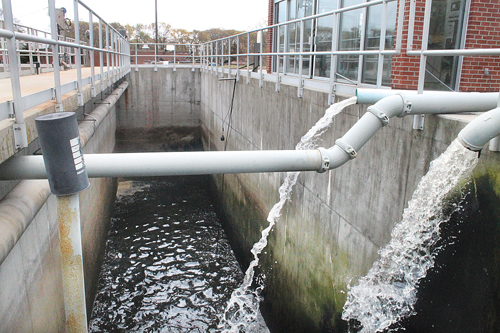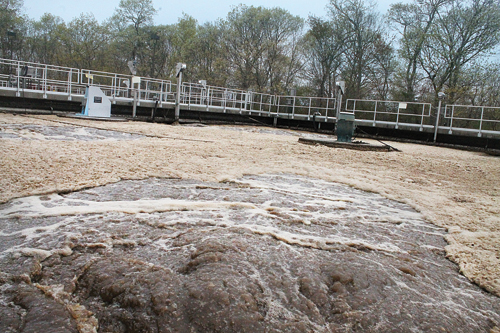Clock ticks on Riverhead Town’s $20 million sewer upgrades

With about eight months left before $20 million in upgrades must be completed at Riverhead’s sewer treatment plant off Riverside Drive, town officials readily admit they are well short of having enough money to fund the project. Town leaders have been preparing two pitches in hopes of acquiring enough funds through Suffolk County to pay for the upgrades.
The Riverhead Sewer District’s assessed rate for properties is currently just .455 percent, or about $35 a year on average for property owners, said sewer superintendent Michael Reichel. If the town can’t secure county money, assessed rates will have to jump by more than 522 percent, up to about $215 a year, to help pay for the necessary upgrades, which are being mandated by the state, town officials said.
No usage rate increases would be planned, Mr. Reichel said.
Riverhead’s main sewer treatment plant, near the county’s Indian Island Country Club, was built in 1937 and has been upgraded twice, most recently in 2000, which at the time helped the town meet state Department of Environmental Conservation requirements, said Riverhead Supervisor Sean Walter.
“The DEC’s basic opinion [after the last upgrade] was that we wouldn’t have to upgrade the sewage treatment plant for the next 20 years,” Mr. Walter said. “But then the DEC found new technology.”
Mr. Reichel said the plant’s permit requires the town to complete an upgrade by January 2014 that will meet new water quality standards. (He noted, however, that construction and installation of the upgrades would take about two years.) The district plans to file for an extension on the required upgrades while additional funding is secured.
“We’re coming to a crunch here,” Mr. Reichel said.
The sewer district spent about $1 million drafting plans for the upgrade in 2009, town officials said. Those plans involve converting and repurposing a number of existing tanks at the plant as a way to contain costs.
The sewer district currently has about $2.1 million available through a state grant, $700,000 set aside in a nitrogen-mitigation fund and a remaining district fund balance that can be applied toward the upgrade, Mr. Reichel said, but that still leaves the district about $12 million short of what’s needed.
“[The planning] is done,” he said. “We know how big it’s going to be, we know the size of the pipes, we just don’t have the money.”

Town officials went before a Suffolk County Legislature sewer committee “multiple times,” Mr. Walter said, but got no closer to acquiring county funds for the project.
Last month, however, the county announced a competitive grant for municipalities to pay for sewer district upgrades.
About $30 million in funding will be available through the county’s Asset Stabilization Reserve Fund, which comes from a countywide quarter-cent sales tax used for land preservation and water quality. Submissions will be evaluated by the Suffolk County sewer infrastructure committee, headed by Legislator Wayne Horsley (D-Babylon), and then presented to the Legislature for approval.
“This pool of funds gives Suffolk County a way to ‘grow’ sewers in Suffolk, which is both an environmental and economic development necessity,” Mr. Horsley said in a statement about the grant last month.
The applications are due by June 4, Mr. Reichel said.
“We’re looking to get as much as we can to go toward the upgrade,” he said.
Mr. Walter said the town will apply for the grant as early as next week.
Town officials also hope to tap into another source of income: the county’s sewer stabilization fund. That fund allows sewer districts in the county that raise sewer rates by more than 3 percent to get additional county funding to stave off further rate increases for customers, town officials said. Mr. Walter said he believes Riverhead is entitled to the fund, even though the local sewer district is run by the town without county involvement.
“We’ve also been very willing to hook up additional facilities,” Mr. Walter said, pointing out that the town’s water treatment plant already services the Suffolk County Center and jail complex in Riverside in Southampton Town.
Those buildings account for about 24 percent of the sewer district’s incoming flow, but pay only about 18 percent of the district’s revenue, Mr. Walter said.
“It’s a sweetheart deal for the county,” he said, hoping the arrangement would bode well for the town’s efforts to get funding.
The sewer treatment plant at the end of River Avenue currently uses biochemical methods to treat the wastewater generated by businesses and homes from downtown Riverhead to Route 58 to the Tanger Outlet Center.
The untreated water flows through a series of metal grates about a half-inch apart before it eventually moves into large 23-feet-deep tanks containing a layer of bacteria-laden “sludge” at the bottom. The water is mixed and aerated in the open-air tanks, Mr. Riechel said, as the “good” bacteria in the tanks devour the harmful germs.
A layer of clean water is left between the sludge at the base of the tank and a thin layer of scum at the top. A floating device called a “decanter” removes this clean water and pumps it into another set of equalization tanks, Mr. Reichel said. The water is then fed through a series of pipes to a bed of ultraviolet lights that kill remaining bacteria. The treated water, which is not safe to drink but is of a higher standard than required for river water, is pumped into the Peconic River.
The $20 million upgrade would install a finer metal strainer at the point where the water initially enters the property, Mr. Reichel said. Instead of being a half-inch apart, the metal grates will be 1/16 of an inch apart, allowing the sewer district to catch smaller physical waste faster.
The plant would use two currently vacant tanks as part of a system to irrigate Indian Island Golf Course with treated water. This would have the added benefit of allowing the county to save precious well water, which it now pulls from to irrigate the course, Mr. Reichel said.
Finally, the upgrade would also include a mesh that will be installed in the equalization tanks that would further filter the clean water produced by the plant, as well as more powerful UV lights that would kill anything in the water, even viruses, to help improve water quality before it is pumped out of the plant.
The town’s property also includes a scavenger treatment plant that takes in wastewater from private and commercial cesspools from across the East End and Brookhaven, Mr. Reichel said.
He said the town has not only readied a proposal for the county’s competitive grant, but has also tested out the planned irrigation system on a smaller but identical golf course built on the sewer district’s property to pilot the program.
Because of the irrigation component, the town was able to secure a $2.1 million grant from the state DEC to help fund the plant upgrades.
“If we don’t get the [rest of the] money, the board’s got to make a decision,” Mr. Reichel said. “But they have no decision to make but to go forward.”
Steve Wirth, owner of Digger O’Dell’s bar and restaurant in downtown Riverhead, said he pays a “sizable part” of his taxes to the sewer district because of his higher usage.
Mr. Wirth said the increases to the assessed value portion of the sewer tax would likely not affect his business as much as any usage rate changes would.
“If it’s necessary and it moves us in the right direction and gets us something better to the environment… you gotta do it,” Mr. Wirth said. “I’m not environmentalist but that’s worth it.”




